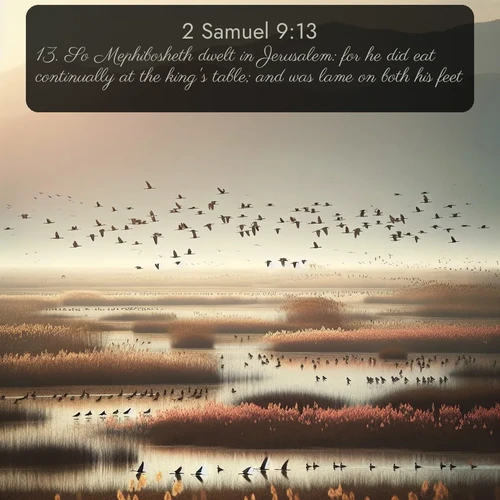2 Samuel 9:13 plusieurs versions / traductions
English Bible Translations
13. So Mephibosheth dwelt in Jerusalem: for he did eat continually at the king's table; and was lame on both his feet.
13. So Mephibosheth dwelt in Jerusalem; for he did eat continually at the king's table. And he was lame in both his feet.
13. So Mephibosheth went on living in Jerusalem; for he took all his meals at the king's table; and he had not the use of his feet.
13. So Mephibosheth dwelt in Jerusalem; for he did eat continually at the king's table. And he was lame on both his feet.
13. So Mephibosheth dwelt in Jerusalem: for he ate continually at the king's table; and was lame in both his feet.
13. And Mephibosheth is dwelling in Jerusalem, for at the table of the king he is eating continually, and he [is] lame of his two feet.
German Bible Translations
13. Mephiboseth aber wohnte zu Jerusalem; denn er aß täglich an des Königs Tisch, und er hinkte mit seinen beiden Füßen.
13. Mephiboset aber wohnte zu Jerusalem, denn er aß täglich an des Königs Tisch. Er war aber lahm an beiden Füßen.
French Bible Translations
13. Mephibosheth habitait à Jérusalem, car il mangeait constamment à la table du roi. Il était estropié des deux pieds.
13. Mephiboscheth habitait à Jérusalem, car il mangeait toujours à la table du roi. Il était boiteux des deux pieds.
13. Mephiboscheth habitait à Jérusalem, car il mangeait toujours à la table du roi. Il était boiteux des deux pieds.
13. Et Mephibosheth habitait à Jérusalem, car il mangeait toujours à la table du roi; et il était boiteux des deux pieds.
13. Et Méphiboseth demeurait à Jérusalem, parce qu'il mangeait toujours à la table du Roi; et il était boiteux des deux pieds.
13. Et Méphibosheth demeurait à Jérusalem, parce qu'il mangeait toujours à la table du roi. Il était boiteux des deux pieds.
Versions with Strong Codes
2 Samuel 9 / KJV_Strong13. So Mephibosheth[H4648] dwelt[H3427] in Jerusalem:[H3389] for[H3588] he[H1931] did eat[H398] continually[H8548] at[H5921] the king's[H4428] table;[H7979] and was lame[H6455] on both[H8147] his feet.[H7272]
Strong Code definitions
H4648 Mphiybosheth mef-ee-bo'-sheth or Mphibosheth {mef-ee-bo'-sheth}; probably from H6284 and 1322; dispeller of shame (i.e. of Baal); Mephibosheth, the name of two Israelites:--Mephibosheth.see H6284 see H1322
H3427 yashab yaw-shab' a primitive root; properly, to sit down (specifically as judge. in ambush, in quiet); by implication, to dwell, to remain; causatively, to settle, to marry:--(make to)abide(-ing), continue, (cause to, make to) dwell(-ing), ease self, endure, establish, X fail, habitation, haunt, (make to) inhabit(-ant), make to keep (house), lurking, X marry(-ing), (bring again to) place, remain, return, seat, set(- tle),(down-)sit(-down, still, -ting down, -ting (place) -uate), take, tarry.
H3389 Yruwshalaim yer-oo-shaw-lah'-im rarely Yruwshalayim {yer-oo- shaw-lah'-yim}; a dual (in allusion to its two main hills (the true pointing, at least ofthe former reading, seems to be that of H3390)); probably from (the passive participle of) 3384 and 7999; founded peaceful; Jerushalaim or Jerushalem, the capital city ofPalestine:--Jerusalem. see H3390see H3384 see H7999
H3588 kiy kee a primitive particle (the full form of the prepositional prefix) indicating causal relations of all kinds, antecedentor consequent; (by implication) very widely used as a relative conjunction or adverb (as below); often largely modified by other particles annexed:--and, + (forasmuch, inasmuch, where-)as, assured(-ly), + but, certainly, doubtless, + else, even, + except, for, how, (because, in, so, than) that, + nevertheless, now, rightly, seeing, since, surely, then, therefore, + (al- )though, + till, truly, + until, when,whether, while, whom, yea, yet.
H1931 huw' hoo of which the feminine (beyond the Pentateuch) is hiyw {he}; a primitive word, the third person pronoun singular, he (she or it); only expressed when emphatic or without a verb; also (intensively) self, or (especially with the article) the same; sometimes (as demonstrative) this or that; occasionally (instead of copula) as or are:--he, as for her, him(-self),it, the same, she (herself), such, that (...it), these, they, this, those, which (is), who.
H398 'akal aw-kal' a primitive root; to eat (literally or figuratively):--X at all, burn up, consume, devour(-er, up), dine, eat(-er, up),feed (with), food, X freely, X in...wise(-deed, plenty), (lay) meat, X quite.
H8548 tamiyd taw-meed' from an unused root meaning to stretch; properly, continuance (as indefinite extension); but used only (attributively as adjective) constant (or adverbially, constantly); ellipt. the regular (daily) sacrifice:--alway(-s), continual(employment, -ly), daily, ((n-))ever(-more), perpetual.
H5921 `al al properly, the same as H5920 used as a preposition (in the singular or plural often with prefix, or as conjunction with a particle following); above, over, upon, or against (yet always in this last relation with a downward aspect) in a great variety of applications (as follow):--above, accordingto(-ly), after, (as) against, among, and, X as, at, because of, beside (the rest of), between, beyond the time, X both and, by (reason of), X had the charge of, concerning for, in (that), (forth, out) of, (from) (off), (up-)on, over, than, through(-out), to, touching, X with.see H5920
H4428 melek meh'-lek from H4427; a king:--king, royal. see H4427
H7979 shulchan shool-khawn' from H7971; a table (as spread out); by implication, a meal:--table.see H7971
H6455 picceach pis-say'-akh from H6452; lame:--lame. see H6452
H8147 shnayim shen-ah'-yim dual of H8145; feminine shttayim {shet-tah'-yim}; two; also twelfth, + twelve, + twenty (sixscore) thousand, twice, two. see H8145
H7272 regel reh'-gel from H7270; a foot (as used in walking); by implication, a step; by euphem. the pudenda:--X be able to endure, X according as, X after, X coming, X follow,((broken-))foot((-ed, -stool)), X great toe, X haunt, X journey, leg, + piss, + possession, time.see H7270
Prédications qui analysent les thèmes 2 Samuel 9
Thèmes : David et Mephibosheth; La bonté du roiLa bonté d’un roi, (récit et parabole évangélique !)
Related Sermons discussing 2 Samuel 9
Themes : David et Mephibosheth; La bonté du roisee also: Bible Key Verses ; KJV Bible Images, BBE Bible images

